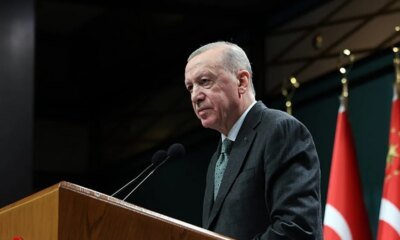Economy
Germany quick to reject EU’s mega $2.3 trillion budget proposal
Germany, the largest member of the European Union and its leading economy, was quick to reject an ambitious 2 trillion euro ($2.3 trillion) budget proposal touted by EU Commission President Ursula Von der Leyen on Wednesday.
Germany said it was “unable to accept” the $2.3 trillion budget for 2028-2034, which von der Leyen called “the most ambitious ever proposed.” Farm unions also quickly came out against proposed reforms to the bloc’s huge agriculture subsidies.
The plan seeks to bolster Europe’s security and ramp up competitiveness, against a backdrop of soaring trade tensions with the U.S., while paying off debts from a massive COVID-19 era loan.
The European Commission put 451 billion euros on the table under a broad “competitiveness” tag that encompasses defense and space – together allocated 131 billion euros, a fivefold increase.
The budget earmarks up to 100 billion euros for the reconstruction of war-torn Ukraine – as well as substantial new “flexibility” funds kept available in the event of crises.
But German government spokesperson Stefan Kornelius said in a statement that “a comprehensive increase in the EU budget is not acceptable at a time when all member states are making considerable efforts to consolidate their national budgets.”
Germany also opposed the commission’s call to make companies with a turnover of more than 100 million euros pay more tax.
While Germany argues that the budget is too large, many EU lawmakers accuse it of not leaving sufficient funds for priorities such as climate adaptation and the agricultural subsidies that make up the largest share of the budget.
Budget Commissioner Piotr Serafin said that under the commission’s plans, 300 billion euros would remain to support farmers – compared to around 387 billion euros, of which 270 billion euros are in direct payouts, under the current seven-year budget.
‘Black Wednesday for farmers’
Brussels says there would be an overhaul of the Common Agricultural Policy (CAP) subsidies – with some funding moved to other budget columns.
But the future of the CAP is headed for a fight, with farmers warning against cuts to their slice of the EU pie – and marching on Wednesday in Brussels to show their resolve.
Hundreds of European farmers joined a protest outside the commission building in Brussels, organized by the pan-European agriculture lobby group Copa-Cogeca.
The group described it as a “Black Wednesday” for farmers, accusing Brussels of seeking to “dismantle the ‘common’ nature of the CAP through concealed budget cuts.”
The warning raised the specter of another confrontation after last year’s protests across Europe by farmers, who were upset at cheap imports, low margins, and the burden of environmental rules.
Hungary, a staunch critic of Brussels and Russia’s closest ally in Europe, meanwhile tapped into rural anger ahead of the plan’s release, while criticizing the money allocated to Kyiv.
“Ukraine would get a massive funding boost, while European farmers lose out,” Hungarian Prime Minister Viktor Orban said.
Battle lines drawn
The announcement sets the stage for two years of fraught negotiations between the European Parliament and 27 member states.
Already stretched thin, some states, such as Germany, are unwilling to contribute more to the common pot.
Unlike in the previous budget, the EU has debts due to the COVID-19 pandemic, when states teamed up to borrow 800 billion euros to support the bloc’s economy. These are estimated to cost 25-30 billion euros a year from 2028.
The previous 2021-2027 budget was worth around 1.2 trillion euros and was made up of national contributions and money collected by the EU, such as customs duties.
National contributions will grow slightly, from 1.13% of member states’ gross national income to 1.15% plus 0.11% devoted to repaying the COVID-19 loan.
The commission will also seek to raise about 58 billion euros a year by collecting money directly through five instruments, including its carbon border tax and a levy on electronic waste.
Member states gave a sneak peek at the fights to come.
France’s European Minister, Benjamin Haddad, hailed the commission’s “ambition,” but Dutch Finance Minister Eelco Heinen, representing one of the frugal states, said the proposed budget was “too high.”
Members of the EU Parliament, however, made it clear that the budget was not enough in their view.
“However, you try to package this, what we have is a real-terms investment and spending freeze,” said a joint statement from the EU lawmakers tasked with steering the budget through parliament.
Economy
Most Americans say GOP tax bill helps the rich, hurts poor: Poll
Republican lawmakers are touting their newly passed tax and spending bill as a victory for working Americans, but a new survey finds most Americans view it as a benefit primarily for the wealthy.
About two-thirds of U.S. adults expect the new tax law will help the rich, according to the poll from The Associated Press-NORC Center for Public Affairs Research. Most – about 6 in 10 – think it will do more to hurt than help low-income people. About half say it will do more harm than good for middle-class people and people like them.
Republicans have already begun airing advertisements framing the legislation as a tax cut for all Americans, highlighting new deductions on tips and overtime income. But Democrats have been making the case that the wealthiest Americans will benefit from the legislation, citing cuts to Medicaid and food assistance programs.
The new poll indicates that Republicans still have persuading to do. The high price tag may also be turning off some Americans. Trump’s approval rating on government spending has fallen since the spring, according to the new survey, and about 6 in 10 U.S. adults across the political spectrum think the government is spending “too much.”
Most people have heard at least something about the new law, according to the poll, which found that about two-thirds of U.S. adults have heard or read “a lot” or “some” about it.
Those who know something about the legislation are more likely to believe it favors the wealthy, compared with people who have heard “only a little” or “nothing at all.”
Anaiah Barrow, a 25-year-old single mom from North Carolina who doesn’t identify with a political party, said she’s concerned that the new law will hurt caregivers like her. Barrow — who’s juggling a job, taking care of two young children and pursuing a degree — is concerned about losing access to day care and food stamps.
“It has a really big effect,” Barrow said of the recently passed legislation, which she has learned about on TikTok. “It may not be as big now, but in the long run it’s going to have that effect — it’s going to hit bad.”
Even many Republicans agree that the wealthy are likely to benefit from the tax and spending law. About half say the law will do more to help the wealthy. A similar percentage say this about middle-class people, while about 4 in 10 Republicans think it will do more to help than hurt low-income people.
Lori Nichols, a 51-year-old caregiver for her elderly mother in Illinois, said the legislation has “very little for the older people and people that are on disability.” Although Nichols is a Republican, she said she didn’t vote in the 2024 presidential election and voted for Democrat Joe Biden in 2020.
“As far as the tax part goes, it seems to me like (Trump’s) just making the rich richer,” Nichols said.
Despite the overall sense that wealthy people will be the primary beneficiaries, Democrats and independents are much likelier than Republicans to think the law could harm them personally.
Nathan Hay, a shift service manager at an international dealership that repairs trucks, said he thinks lower-income people might see a “slight increase” in taxes but still supports the bill. “Personally, it’s not helping me a ton,” Hay said, but he believes it will help small businesses, which have been a staple in his own life and his family’s.
About half of Republicans expect the legislation to do more to help “people like you,” compared with about 2 in 10 independents and just 6% of Democrats.
“I’m not a tax accountant, but it sounds as if it would be more beneficial to (people) in the higher tax level,” said Republican Geraldine Putnam, 87, a Trump voter who lives in the rural south.
“It’s not that I would want to take away the incentive to become more wealthy – that’s the American dream,” Putnam said.
But she also thinks she’ll end up paying more in taxes. “What he’s doing I’m sure he thinks is correct,” she said of Trump. “It’s just the extreme method that he’s using.”
The law’s hefty price tag may be factoring into some Americans’ assessments of the law. The poll found they are less likely to approve of how Trump is handling government spending since the spring.
Just 38% of Americans approve of how Donald Trump is handling government spending, compared with 46% in an AP-NORC poll conducted in March.
Republicans are less likely to say the government is spending “too much” than they were in March 2023, when Joe Biden was president, but about 6 in 10 still think the government is overspending. A similar share of Democrats say the same thing.
Putnam, now a retiree, took issue with Trump’s cuts in federal workers, even though she says she approves of being able to “trim off people who aren’t really doing their jobs.”
The way she sees it, Trump drew attention to people abusing social services, then “fires the people in the office” that are investigating that very fraud and abuse. “What’s the sense in that?” she asked.
Economy
EU, UK slap Russia with new sanctions targeting energy revenue, spies
The European Union and Britain stepped up pressure on Russia on Friday over its war on Ukraine with new sanctions targeting its energy sector, fleet of aging “shadow” oil tankers and military intelligence services.
“The message is clear: Europe will not back down in its support for Ukraine. The EU will keep raising the pressure until Russia ends its war,” EU foreign policy chief Kaja Kallas said after the bloc agreed its new measures, including a new oil price cap.
Kallas said it’s “one of its strongest sanctions packages against Russia to date” linked to the war, now in its fourth year. It comes as European countries start to buy U.S. weapons for Ukraine to help the country better defend itself.
Ukrainian President Volodymyr Zelenskyy welcomed the new measures, describing them as a “timely and necessary” step amid intensified Russian attacks.
“All infrastructure of Russia’s war must be blocked,” Zelenskyy said, adding that Ukraine will synchronize its sanctions with the EU and introduce its own additional measures soon.
Kremlin spokesperson Dmitry Peskov brushed off the EU move, saying that “we consider such unilateral restrictions unlawful.”
“At the same time, we have acquired certain immunity from sanctions. We have adapted to living under sanctions,” Peskov said in a conference call with reporters. “We will need to analyze the new package in order to minimize negative consequences from it.”
The U.K., meanwhile, imposed sanctions on units of Russia’s military intelligence service, GRU. Also added to the list were 18 officers the U.K. said helped to plan a bomb attack on a theater in southern Ukraine in 2022 and to target the family of a former Russian spy who was later poisoned with a nerve agent.
Hundreds of civilians sheltering in the theater in Mariupol were killed in March 2022, shortly after Russia invaded Ukraine.
“GRU spies are running a campaign to destabilize Europe, undermine Ukraine’s sovereignty and threaten the safety of British citizens,” U.K. Foreign Secretary David Lammy said.
NATO also condemned Russia’s cyberattacks, saying in a statement that “we will respond to these at a time and in a manner of our choosing, in accordance with international law, and in coordination with our international partners including the EU.”
The European Commission, the EU’s executive branch, had proposed to lower the oil price cap from $60 to $45, which is lower than the market price, to target Russia’s vast energy revenues. The 27 member countries decided to set the price per barrel at just under $48.
The EU had hoped to get major international powers in the G-7 involved in the price cap to broaden the impact, but the Trump administration could not be brought on board.
Oil income is the linchpin of Russia’s economy, allowing President Vladimir Putin to pour money into the armed forces without worsening inflation for everyday people and avoiding a currency collapse.
A new import ban was also imposed in an attempt to close a loophole allowing Russia to indirectly export crude oil via a number of non-EU countries.
The EU also targeted the Nord Stream pipelines between Russia and Germany to prevent Putin from generating any revenue from them in the future, notably by discouraging would-be investors. Russian energy giant Rosneft’s refinery in India was hit as well.
The pipelines were built to carry Russian natural gas to Germany but are not in operation.
On top of that, the new EU sanctions targeted Russia’s banking sector, with the aim of limiting the Kremlin’s ability to raise funds or carry out financial transactions. Two Chinese banks were added to the list.
The EU has slapped several rounds of sanctions on Russia since Putin ordered his troops into Ukraine on Feb. 24, 2022.
More than 2,400 officials and “entities” – often government agencies, banks, companies or organizations – have been hit with asset freezes and travel bans.
But each round of sanctions is getting harder to agree, as measures targeting Russia bite the economies of the 27 member nations. Slovakia held up the latest package over concerns about proposals to stop Russian gas supplies, which it relies on.
German Chancellor Friedrich Merz said he had spoken to Slovak Prime Minister Robert Fico “almost daily” in recent days to convince him to change his mind. “But it took a very long time again – the processes are too sluggish,” he told reporters in Berlin.
The last raft of EU sanctions, imposed on May 20, targeted almost 200 ships in Russia’s sanction-busting shadow fleet of tankers. On Friday, 105 more ships were blocked from European ports, locks and from ship-to-ship transfers, bringing the total number of vessels now sanctioned to more than 400.
Economy
Türkiye, UK complete initial free trade deal update talks
Türkiye and Britain have “successfully” finished the first round of talks on updating their free trade agreement (FTA), the Turkish Trade Ministry said on Friday.
The negotiations in Ankara with the high-level participation of the relevant institutions of both countries have been “extremely productive,” with many critical topics discussed in order to deepen the scope of the FTA, the statement said.
“The strategic economic cooperation between Türkiye and the U.K. is gaining new and strong momentum,” the statement said.
The two countries already have an FTA, which was rolled over when Britain left the European Union, but a review by both sides has concluded there was room for improvement under a new deal.
Trade talks were paused during last year’s election that saw Labour Party return to government after 14 years in opposition.
The updated FTA will provide new mutual market openings in agricultural products, the ministry said, adding that comprehensive provisions will be included to provide a mutually beneficial cooperation environment between the two countries regarding trade in services.
“In this context, possible opportunities in the field of financial services, including Islamic finance, will be explored, and service sectors in which our country is competitive, such as health services and audiovisual services, will be considered,” it said.
It noted that joint steps that can be taken to facilitate investments will be discussed, mutual recognition of geographically marked products will be ensured, and awareness-raising steps will be taken for small- and medium-sized enterprises (SMEs).
“Areas of cooperation on innovation, consumer protection and women’s economic empowerment will be concretized. The sustainable development dimension of trade in environment and labor issues will be reflected and customs procedures will be simplified in traditional and digital channels within the scope of trade facilitation,” it added.
The statement stressed both sides’ strong mutual will to complete the FTA update as soon as possible in a way that will contribute to the prosperity of both countries.
The annual trade volume between the two countries reached $22 billion in 2024, with the U.K. ranking as Türkiye’s seventh-largest trading partner, the ministry said. Türkiye runs a trade surplus of $8 billion.
“In this context, the U.K. market, with a population of 69 million, maintains its importance as a strategic economic partner that supports employment in Türkiye while offering a strong demand for our products,” the statement said.
The next round of negotiations is expected to take place by the end of 2025.
Economy
CBRT seen kicking off new rate-cut cycle amid cooling prices
The Turkish central bank’s upcoming interest rate decision is expected to mark the start of a new rate-cutting cycle and is being closely watched as the main item on the market agenda, as disinflation continues and market turmoil has largely faded.
Next Thursday’s meeting of the Monetary Policy Committee (MPC) is expected to see the Central Bank of the Republic of Türkiye (CBRT) kick off a renewed easing cycle with a 250 basis-point rate cut, according to a survey and a Wall Street bank.
All but one of the 17 economists in a Reuters poll forecast the central bank to cut the policy rate at the July 24 meeting. The median forecast was for a 250 basis-point cut to 43.50%, with predictions ranging from 42.50% to 44.50% among those expecting an easing step.
Thirteen respondents expected a cut of 250 basis points, while one predicted the bank to hold rates at 46%.
Most expect rate cuts to continue in the months ahead, with the policy rate falling to 36% by the end of 2025, according to the median of 17 forecasts.
The monetary easing is likely to continue through at least the third quarter of 2026, an earlier Reuters poll of economists showed.
If delivered, the move would mark the first cut since a surprise 350 basis-point hike in April, which reversed an earlier easing cycle. That tightening helped stabilize markets after the jailing of Istanbul Mayor Ekrem Imamoğlu sent Turkish assets and the lira sharply lower in March.
Imamoğlu was arrested pending trial over graft charges.
Morgan Stanley also expects a 250 basis-point cut this month, followed by three additional cuts of the same size to bring the policy rate to 36% by year-end.
“While we expect a rise in the monthly inflation trend in July due to administered price adjustments, we expect this to be temporary given weaker domestic demand (negative output gap) and our expectation for the bank to deliver prudent rate cuts to keep the monetary stance tight,” the bank said.
Aggressive monetary tightening since mid-2023, combined with favorable energy prices, has helped reduce Türkiye’s annual inflation rate by more than half over the past year.
The inflation lastly dipped to 35.05% in June. The better-than-expected print renewed expectations that the central bank would begin cutting rates again.
Monthly inflation was 1.37%, with price declines in key categories such as food and beverages reinforcing the central bank’s view that a disinflation trend is taking hold.
Economy
Mastercard, Visa probed in Türkiye over cross-border payment barriers
Türkiye’s competition watchdog on Friday announced it had launched an investigation into global card payment giants Mastercard and Visa to determine whether their scheme rules restricted Turkish payment institutions from servicing merchants based abroad.
The Competition Authority (RK) said domestic payment service providers have been able to offer services to consumers wishing to make payments to merchants based abroad through bilateral agreements established with foreign entities.
“Under these bilateral agreements, cross-border payment transactions are localized and can be carried out without being subject to Mastercard or Visa’s foreign transaction fees,” the board said.
Initial findings from on-site inspections suggest that Mastercard and Visa may be obstructing the operations of payment service providers engaged in such bilateral agreements, claiming these activities violate their self-defined scheme rules, and may be using various methods, such as imposing sanctions on banks, to do so, it noted.
The investigation will examine whether the companies have prevented the use of their card/POS infrastructure by foreign-based merchants and whether they have taken steps to exclude alternative payment solutions from the market, the authority noted.
The board launched a separate investigation in November last year to examine whether Mastercard and Visa’s discount and incentive structures created de facto exclusivity with card-issuing banks in Türkiye, potentially stifling competition from rival networks.
In 2015, Mastercard was fined by for practices related to its card payment systems.
Economy
EU eases Schengen access for Turks, urged to revive visa-free talks
The European Union has eased rules for Turks to use its open-border Schengen area, the bloc’s ambassador to Ankara announced on Friday, calling for the urgent revival of negotiations on visa-free travel for Turks.
Turkish Trade Minister Ömer Bolat confirmed that the European Commission has issued a new document aimed at facilitating and accelerating Schengen visa procedures for Turkish citizens and has shared it with EU member states.
For years, Turkish citizens and businesses have complained about the EU’s visa system. The EU has argued the processes – managed by accredited visa agencies – have been slow due to the high number of applications and that it was discussing possible workarounds with Ankara.
The new guidelines allow for longer-term, multiple-entry visas to be issued to Turkish nationals who have previously obtained a Schengen visa and traveled regularly without overstaying.
Bolat recalled the difficulties Turkish citizens have faced in recent years, including long appointment wait times, the issuance of very short-term visas and high rejection rates.
These concerns have been consistently raised with EU officials at all levels, including the European Commission, the European Council and bilateral meetings with member states, he said in a statement on Friday.
Multiple-entry visa pathway
Ambassador Thomas Hans Ossowski said the new rules would help address Turks’ complaints over long bureaucratic processes, but warned it was not enough to permanently solve the problems.
“It will be much easier and much faster for Turkish citizens,” Ossowski told reporters in Ankara, referring to the European Commission’s new decision, in effect since July 15, simplifying the path to multiple-entry visas for Turks.
Turks who previously used visas correctly will be eligible for a six-month visa as early as their second application, followed by one-year, three-year and five-year multiple-entry visas.
Türkiye has been an EU membership candidate since 1999 but its accession process has been frozen for years over multiple disagreements, including the prolonged process of expansion of the scope of the customs union agreement, maritime issues with Greece and Greek Cyprus, and EU policies on Syrian refugees.
There have recently been signs of increased engagement and economic cooperation.
Renewed push for visa-free travel
Ossowski said the EU had for more than a decade offered Türkiye the prospect of visa-free travel and stressed the need to return to the liberalization process.
Negotiations for visa-free travel between the EU and Türkiye began in 2016 but yielded no results.
“Every other candidate country has visa-free travel except Türkiye,” he said. “It is urgent to re-engage in this process of visa-free travel in the Schengen space and the EU,” Ossowski added.
The Commission is ready to restart formal negotiations after the summer and work with Ankara on fulfilling the six remaining benchmarks required by the visa liberalisation roadmap, he said.
“We are ready, the Commission is ready to work closely with Turkish authorities,” he said.
Diplomatic engagement
Bolat said, Türkiye has pursued a positive agenda with the EU, initiating a high-level trade dialogue and holding key meetings in both Ankara and Brussels to begin removing barriers in bilateral relations.
“We have always reminded EU authorities and member states that visa liberalization is a right granted to Turkish citizens under international agreements,” he noted.
“In the meantime, while we await the removal of visa restrictions, we have stressed the need for practical solutions: shortening appointment times for business, tourism, transport and education-related travel, and improving the capacity of EU embassies and consulates in Türkiye.”
He noted that EU officials have acknowledged Türkiye as the second-largest recipient of Schengen visas globally – after China – with over 1 million visas issued annually and an average rejection rate of around 15%.
The latest round of detailed discussions took place on July 1 during the Türkiye-EU High-Level Trade Dialogue in Ankara.
According to Bolat, EU officials informed them during those talks that a new visa facilitation scheme was in the works.
“We are pleased to see that the European Commission has finalized and circulated this document to member states as of yesterday,” he said. “It envisions longer-term, multiple-entry visas for Turkish citizens who have demonstrated regular and reliable travel behavior, with no migration or security risk.”
“This is an important and positive development for our citizens in terms of tourism, business, trade, investment, education, academia, and civil society engagements.”
‘No excuse’
Bolat stressed that embassies and consulates of the 25 Schengen countries “no longer have any excuse” to delay the process.
“To accelerate this implementation, we urge urgent upgrades to consular infrastructure, including buildings, staffing, and IT systems,” he added. “The European Commission has responded positively to our calls, officially launching the process for issuing long-term, multiple-entry visas through this new directive to member states.”
“This is a major step that will enhance cooperation between Türkiye and EU countries in trade, education, tourism, culture and investment,” Bolat said, calling visas a “physical barrier to the movement of people” that is now being eased.
Bolat also stated that efforts will continue to ease and expedite procedures for first-time visa applicants.
“We believe this facilitation and acceleration process will soon apply to first-time applicants as well, provided that everyone complies with the updated regulations,” he said.
Customs union expansion
Looking ahead, Bolat reiterated that Türkiye expects progress in expanding and modernizing the EU-Türkiye Customs Union to include services and e-commerce.
“The Commission has already recommended the start of negotiations. The matter now rests with the European Council. Once approval is granted, we are ready to begin talks immediately – and so is the Commission,” he concluded.
First implemented in 1995, the Türkiye-EU Customs Union has helped boost economic ties. But business groups have long argued that the agreement is outdated and ill-suited for today’s trade environment.
A host of disagreements over recent years have stalled the negotiations. The deeper 1990s-era agreement would be expanded to services, farm goods and public procurement. The current deal only covers a limited range of industrial products.
Türkiye’s total trade volume with Europe – including both EU and non-EU countries – reached $327 billion in 2024, with $149 billion in exports and $178 billion in imports, according to the Foreign Economic Relations Board (DEIK).
-

 Daily Agenda2 days ago
Daily Agenda2 days agoTürkiye on the 9th anniversary of July 15 in the squares
-

 Lifestyle2 days ago
Lifestyle2 days agoWhere nature meets refinement: Göcek ready for world spotlight
-

 Economy1 day ago
Economy1 day agoStudy reveals persistent pay gap for immigrants in major economies
-

 Daily Agenda1 day ago
Daily Agenda1 day agoLAST MINUTE: President Erdoğan: Israel is a ripped terror state
-

 Refugees1 day ago
Refugees1 day agoUN talks with rival leaders of Cyprus fail to reach deal on new border crossings
-

 Economy3 days ago
Economy3 days agoUK inflation jumps in June to its highest in over year
-

 Economy1 day ago
Economy1 day agoTürkiye, S. Korea agree to deepen defense, nuclear, green energy co-op
-

 Daily Agenda2 days ago
Daily Agenda2 days agoOmer Çelik’s reaction to the ‘lgs’ lie of the opposition: Intentional evil and discord campaign!




